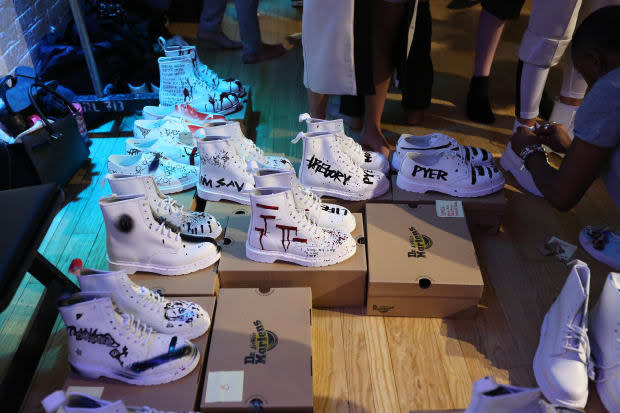Must Read: What Fashion Can Do Beyond a Black Square on Instagram, Ralph Toledo on the Future of the Runway
Plus, Prabal Gurung writes an op-ed for the "Washington Post."

These are the stories making headlines in fashion on Monday.
What the fashion industry can do, beyond posting a black square on Instagram
In the New York Times, Vanessa Friedman reflects on what actions the fashion industry can take beyond expressing solidarity publicly for the Black community, in order to actually, meaningfully diversify and be representative of groups it has historically marginalized. There need to be more Black designers in creative director positions and Black executives in the C-suite, yes — however, companies also need to amplify the voices of their staff, as opposed to only letting one or two people at the highest level (who, a lot of the time, are white) take up that platform. "Fashion likes to control its messaging, to frame its image and images in the glossiest, most perfect way possible. But pulling back the curtain, admitting imperfection and sharing it, may actually be the best look," Friedman argues. {The New York Times}
Part two of WWD's interviews with Black fashion creatives on the work that needs to be done
WWD published the second part of a series speaking to Black creatives in fashion about what needs to change in the industry. Brother Vellies' Aurora James talked about her 15 Percent Pledge; hairstylist Ted Gibson explained the importance of having diversity behind the scenes; Hanifa's Anifa Mvuemba emphasized the importance of giving credit where credit is due, particularly when it comes to Black innovators. You can read their thoughts (and more) over at WWD. {WWD}
Ralph Toledano, president of the Fédération de la Haute Couture et de la Mode, talks the future of fashion shows
Famed fashion executive and current president of the Fédération de la Haute Couture et de la Mode Ralph Toledano spoke to WWD about the future of fashion week and runway shows, as Paris Fashion Week Men's and Haute Couture Fashion Week go all-digital this summer. He doesn't think these events are gone forever. "I do not think that we are even close to finding an alternative to a fashion show," he said. However, he did admit that the calendar may look a little different, as industry groups express their issues with the status quo, and the cost and environmental impact of shows continue to weigh on companies. {WWD}
The Method Male's Saleam T. Singleton writes an open letter to the beauty industry
For Byrdie, men's beauty and skincare advocate Saleam T. Singleton addresses the ways that the beauty industry hasn't shown up for Black shoppers (who represent a significant portion of its customer base) in the past — and what it needs to do to be better moving forward. "Stand with us by creating a lasting change in the way beauty operates," he writes. "Most importantly, acknowledge the voices of all people who make this industry what it is today. This shouldn't be a trend, a strategy, or a reaction. This has to become the norm." {Byrdie}
In Harlem, a group of Black men pays their respects to George Floyd through fashion
As George Floyd's funeral took place in Minneapolis last week, a group of Black men marched in Harlem in his honor, dressed in suits or "your best" — whether that meant tailored separates, Black Lives Matter shirts or ankara prints, as Vogue reports. Photographer Ian Reed documented the crowd, and Chioma Nnandi spoke with Gabriel M. Garmon, the event's organizer, and participants about the significance of the gathering. "We wanted to honor him and our other lost brothers and sisters in a way that felt appropriate," Garmon told the magazine. {Vogue}
Prabal Gurung on why it's time for Asian Americans to shed the "model minority" myth and stand for George Floyd
In an op-ed for the Washington Post, designer Prabal Gurung brings attention to ways in which the Asian American community has been complicit in anti-blackness in the U.S. "Often labeled the 'model minority,' a concept based in eugenics and white supremacy, Asian Americans have collectively distanced ourselves from Black and other marginalized communities in an attempt to protect our own security and belonging," he writes. Gurung goes on to argue: "I believe that speaking out against racism, disparities and xenophobia is the ultimate show of respect. It shows our ancestors that their hard work is not in vain, that we understand all they had to overcome, and that they sacrificed their voice so we could find ours. We must stop the cycle of submission, and take on the mantle to fight for our rights and the rights of others. By opening the door for future generations, we can begin the process of healing." {Washington Post}
Want more Fashionista? Sign up for our daily newsletter and get us directly in your inbox.
